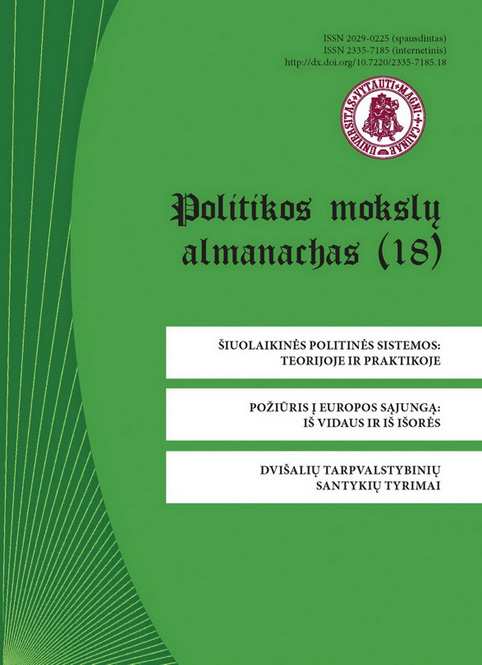Viktoro Orbano politinės reformos 2010–2014 m. laikotarpiu
VIKTOR ORBAN HUNGARIAN POLITICAL SYSTEM CONCEPT
Author(s): Andrius SlaninaSubject(s): Politics / Political Sciences
Published by: Vytauto Didžiojo Universitetas
Keywords: Hungarian political system; Viktor Orban policy;, Fidesz; post-Communism transformation; political reforms in
Summary/Abstract: Nuo 2010 m. Vengrijoje prasidėjo nauji procesai, kurie keitė valstybės demokratijos raidą. Šiuos procesus pradėjo formuoti nuo 2010 m. ministru pirmininku išrinktas partijos „Fidesz“ – Vengrijos pilietinis aljansas“ lyderis Viktoras Orbanas. Šis politikas, propaguojantis nacionalkonservatoriškas vertybes, pradėjo reformų ciklą, kurio metu pakeista Vengrijos Konstitucija, įvesta įstatymų, besikertančių su Europos Sąjungos teisės aktais, siekta pakeisti politinę sistemą, susiformavusią posocialistinės transformacijos metu. Šiame straipsnyje analizuojamos 2010–2014 m. V. Orbano vykdytos politinės reformos. Šių reformų įtaka turi daug reikšmės tolesnei Vengrijos politinės sistemos raidai. Pirmiausiai bus nagrinėjama posocialistinės transformacijos sąvoka ir įtaka Vengrijos politinės sistemos raidai, apžvelgiama susidariusi politinė padėtis prieš 2010 m. rinkimus į Vengrijos parlamentą. Pagrindinis dėmesys skiriamas V. Orbano ir jo partijos „Fidesz“ pradėtoms reformoms, pakeitusioms Vengrijos politinę sistemą ir demokratijos raidą valstybėje. Siekiama išdėstyti galimas V. Orbano politinės sistemos koncepcijas, todėl straipsnyje pateikiama „Fidesz“ partijos ir V. Orbano ideologijos, politikos ir elektorato analizė, pagrindinės naujos Vengrijos Konstitucijos ypatybės ir V. Orbano santykis su kitomis Vengrijos politinėmis jėgomis. Išsiaiškinta, kad V. Orbano reformų įtaka Vengrijos politinei sistemai ir demokratijos raidai yra neigiama.Since 2010, Hungary started new processes which changed democracy development in the state. These processes started when Prime Minister, leader of “Fidesz – Hungarian Civic Alliance” Viktor Orban, was elected. This politician represented values of the the National-conservatism. He started the reform cycle, which replaced the Fundamental Law of Hungary that introduces laws intersecting with the European Union legislation. This law seeks to change the political system which was formed during the post-socialist transformation. This article analyzes the evolution of political system in Hungary during the post-socialist transformation and cardinal changes in its political system since 2010, when V. Orban became the Prime Minister of Hungary. This article will particularly examine the concept of post-socialist transformation and its impact on the development of Hungarian political system. Later, it will overview the resulting political situation after the 2010 elections of the Hungarian parliament. The main focus will be placed on V. Orban and Fidesz party. Fidesz and Orban initiated reforms that changed the Hungarian political system and initiated the development of democracy in the country. The article tries to introduce to possible concepts of V. Orban political system. It provides with ideology and politics of V. Orban and Fidesz party, their electoral analysis, major aspects from new Fundamental Law of Hungary, and V. Orban‘s relationship with other Hungarian political forces. Article reveals that V. Orban’s policy has a negative impact on the Hungarian democracy.
Journal: Politikos mokslų almanachas
- Issue Year: 2015
- Issue No: 18
- Page Range: 31-58
- Page Count: 28
- Language: Lithuanian

